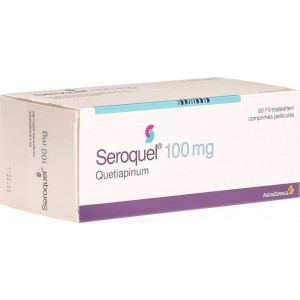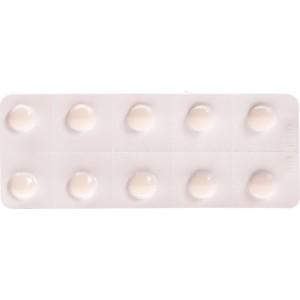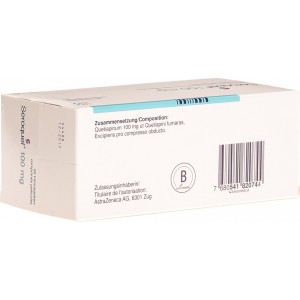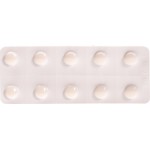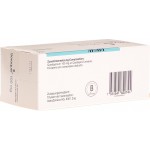What is Seroquel and when is it used?
Seroquel is used in adults to treat mental illnesses that affect thinking, perception, sensitivity, motivation and / or actions (schizophrenia). Typical symptoms can be e.g. hallucinations (hearing, seeing or feeling something that doesn't really exist), delusional ideas (strange thoughts that can sometimes arouse anxiety), unusual distrust, emotional and social withdrawal, feelings of loneliness and confusion, tension and anxiety.
Seroquel is also used alone (up to 12 weeks) or combined with lithium or valproate (3-6 weeks) for a short-term treatment of adult patients whose disease is characterized by a particularly elevated and excitable mood (manic episode in bipolar disorder). In this state, patients can experience reduced sleep requirements, excited speech, a rapid succession of thoughts and ideas.
Seroquel is also used in adults to treat depression if your doctor has diagnosed you with bipolar illness.
Seroquel is used for relapse prophylaxis in adult patients with bipolar disorder if they have responded well to Seroquel during the acute phase of the disease.
Seroquel is used in adolescents aged 13 to 17 for the treatment of mental illnesses affecting thinking, perception, sensitivity, motivation and / or actions (schizophrenia). Typical symptoms can be e.g. hallucinations (hearing, seeing or feeling something that doesn't really exist), delusional ideas (strange thoughts that can sometimes arouse anxiety), unusual distrust, emotional and social withdrawal, feelings of loneliness and confusion, tension and anxiety.
Seroquel is used in children and adolescents aged 10 to 17 to treat a particularly high and excitable mood (manic episode in bipolar disorder) for 3 weeks.
What must also be taken into account during treatment?
It may be helpful to tell a family member or good friend that you are suffering from depression or another mental illness and ask them to read this information intended for patients. You might also ask this person if they think their depression or mental illness has worsened or if they are worried about their behavior being changed.
When can Seroquel not be taken?
If you have already experienced a hypersensitivity reaction to Seroquel please inform your doctor before starting therapy. Seroquel must not be taken concomitantly with certain medicines for HIV infections, fungal infections or bacterial infections (macrolide antibiotics).
Seroquel should not be taken while breastfeeding.
When is caution required in the administration of Seroquel?
Tell your doctor if you are taking medications for anxiety, depression, epilepsy (e.g. phenytoin or carbamazepine), tuberculosis (e.g. rifampicin), psychosis (e.g. risperidone), fungal infections, infections (e.g. macrolide antibiotics) or high blood pressure. Also tell your doctor if you are taking medicines that can cause constipation or affect the function of nerve cells (so-called 'anticholinergic' medicines).
Tell your doctor
- if you have heart problems and / or if you have low or high blood pressure, or have had a heart attack or seizure in the past. Likewise, tell your doctor if you have had a stroke or other cerebral circulatory disorders, regardless of whether they have been transient or have left permanent consequences, such as for example. a paresis;
- if your breathing is briefly interrupted during your normal night's rest (so-called 'sleep apnea'), or if you have had episodes of sleep apnea in the past and if you use medications that reduce normal brain activity;
- if you had a condition where you were unable to empty your bladder completely (urinary retention), if you have an enlarged prostate, an obstructed bowel or high intraocular pressure;
- if you have suffered or still suffer from liver dysfunction, as the dosage may need to be changed under certain circumstances;
- if you have diabetes, because existing diabetes may get worse, or during treatment with Seroquel you may often experience an increase in blood sugar to abnormal levels (hyperglycaemia). There have also been very rare cases of blood acidification (diabetic ketoacidosis);
- if you know that you have had a low white blood cell count in the past.
- if you have had a history of alcohol or drug abuse in the past.
If you are in hospital, tell the medical staff that you are taking Seroquel.
Tell your doctor if you feel very drowsy.
Rarely, a so-called neuroleptic malignant syndrome occurs, mainly manifesting itself with fever, irregular heartbeat, disturbed consciousness and muscle stiffness. Another rare side effect (the so-called serotonin syndrome) which can occur especially when combined with certain other medications, is manifested by blurred consciousness, muscle stiffness, muscle tremors, twitching and fever. Either way, a potentially fatal condition can develop. Therefore, tell your doctor immediately.
Tell your doctor as soon as possible
- if you experience uncontrolled movements, mainly of the face or tongue, during Seroquel therapy;
- if you have a fever, flu-like symptoms, sore throat or another infection, as these may be due to a very low level of white blood cells. It may be necessary to stop Seroquel therapy and / or start treatment for these symptoms;
- if you suffer from constipation with persistent abdominal pain or from constipation that does not respond to treatments, as this can lead to severe intestinal blockage.
In individual patients, weakening and inflammation of the heart muscle (cardiomyopathy and myocarditis) have been reported; it is not excluded that this may be related to treatment with Seroquel.
Life-threatening reactions to the medicine with severe skin reactions (which may affect the mucous membranes), fever, changes in blood values and other symptoms have been observed while using Seroquel (see also 'What side effects may Seroquel have?'). If these reactions develop, Seroquel should be stopped immediately and a doctor consulted.
Your doctor will likely check your blood lipid and electrolyte values, blood sugar or thyroid hormone concentration, as they can be affected by Seroquel.
Body weight gain has been observed in some patients taking Seroquel. You and your doctor should check your weight regularly.
If you suffer from depression and / or other mental illnesses, you may have thoughts of harming or killing yourself. These thoughts may arise to a greater extent more during the first few weeks of treatment. If you have thoughts of harming or killing yourself, tell your doctor straight away or go to a hospital straight away.
Avoid consuming alcohol while taking Seroquel. You should not consume grapefruit juice while being treated with Seroquel.
This medicinal product contains less than 1 mmol (23 mg) sodium per film-coated tablet, ie it is essentially 'sodium-free'.
If you have been told by your doctor that you have an intolerance to some sugars, contact your doctor before taking this medicine.
If Seroquel treatment is stopped abruptly, withdrawal symptoms such as nausea, vomiting, diarrhea, dizziness, headache, irritability and insomnia may occur. Therefore contact your doctor if a withdrawal of the medicine is planned.
This medicine can reduce the ability to react, the ability to drive a vehicle and the ability to use tools or machines! Therefore, he must wait to know his individual reaction before driving a vehicle or using machines.
Seroquel is not recommended for use in older patients with dementia.
Tell your doctor or pharmacist just in case
- suffer from other diseases
- suffer from allergies or
- take other medicines (even if purchased on your own) or apply them externally.
Can Seroquel be taken while pregnant or breastfeeding?
Tell your doctor if you are pregnant, planning to become pregnant or breastfeeding. Seroquel should not be taken during pregnancy, except in special cases where an express exception is made by the doctor. You should not breastfeed while being treated with Seroquel.
If Seroquel is used during the last trimester of pregnancy, the baby may have tremor, muscle stiffness, weakness, sleepiness, agitation, difficulty breathing or problems with feeding. If you are pregnant, please inform your doctor immediately to discuss what to do. Suddenly stopping Seroquel can have serious consequences. Also inform your gynecologist or obstetrician immediately about taking the medicine during pregnancy, especially if the baby develops the symptoms described after delivery.
How to use Seroquel?
Your doctor will determine the dosage indicated in your case. Seroquel can be taken with or without food. Swallow the film-coated tablet whole with some water.
Seroquel is taken twice a day, in the morning and in the evening, to treat mental illnesses that affect thinking, perception, sensitivity, motivation and / or actions (schizophrenia). The adult dose of Seroquel is usually increased during the first 4 days of treatment according to the following schedule:
Day 1: 50 mg per day (1 25 mg film-coated tablet in the morning and 1 25 mg film-coated tablet in the evening).
Day 2: 100 mg per day (2 x 25 mg film-coated tablets in the morning and 2 x 25 mg film-coated tablets in the evening).
Day 3: 200 mg per day (1 x 100 mg film-coated tablet in the morning and 1 x 100 mg film-coated tablet in the evening).
Day 4: 300 mg per day (1 x 100 mg film-coated tablet in the morning and 1 200 mg film-coated tablet in the evening).
From the 5th day the usual daily dose is 300 mg - 450 mg. Your doctor may still prescribe a higher or lower dose depending on your response to therapy (daily doses between 150 mg and 750 mg).
In the treatment of a particularly high and excitable mood (mania), Seroquel is taken twice a day, in the morning and in the evening. The daily dose for the first four days of therapy is 100 mg (day 1), 200 mg (day 2), 300 mg (day 3) and 400 mg (day 4). Further dose increases up to a daily dose of 800 mg on day 6 can be made in maximum increments of 200 mg per day. The dose may be increased up to a maximum of 800 mg based on each patient's clinical response and tolerability. The effective dose is usually between 400 and 800 mg per day.
For the treatment of depression in patients in whom an elevated and excitable mood (mania) alternates with a depressed mood (bipolar disorder), 50 mg on day 1, 100 mg on day 2, should be taken in the evening before bedtime. Day, 200 mg on day 3 and 300 mg on day 4.
The same doses of Seroquel used in the acute phase are used for the prophylaxis of relapses in bipolar disorder. Depending on the individual patient's clinical response and tolerability, the doctor may adjust the dose within a dose range of 300 to 800 mg per day.
For elderly patients (over 65 years) a lower dosage schedule is used, which is determined by the doctor.
For the treatment of adolescents aged 13 to 17 with mental illness affecting thinking, perception, sensitivity, motivation and / or actions (schizophrenia) Seroquel should be taken two or three times a day. The intake can take place regardless of meals. The daily dose for the first 5 days of therapy is 50 mg (1st day), 100 mg (2nd day), 200 mg (3rd day), 300 mg (4th day) and 400 mg (5th day) ). After the 5th day of therapy the dose can be adjusted, depending on the individual patient's clinical response and tolerability, within the effective dose range of 400 to 800 mg per day). Dose adjustments should be made in steps of max. 100 mg per day.
The safety and efficacy of Seroquel in children and adolescents with schizophrenia under 13 years have not been investigated so far and therefore Seroquel should not be used in this age group.
To treat a particularly high and excitable mood (mania), children and adolescents aged 10 to 17 should take Seroquel two or three times a day. The intake can take place regardless of meals. The daily dose for the first 5 days of therapy is 50 mg (1st day), 100 mg (2nd day), 200 mg (3rd day), 300 mg (4th day) and 400 mg (5th day) ). After the 5th day of therapy the dose can be adjusted, depending on the individual patient's clinical response and tolerability, within the effective dose range of 400 to 600 mg per day. Dose adjustments should be made in steps of max. 100 mg per day.
The safety and efficacy of Seroquel in children under 10 with bipolar mania have not been investigated so far therefore Seroquel should not be used in this age group.
The use and safety of Seroquel for the treatment of depression in bipolar disorders in children and adolescents has not been investigated so far.
Grapefruit juice should not be consumed while being treated with Seroquel.
Seroquel tablets have different colors and sizes depending on the dosage. So don't be surprised if your Seroquel tablets look different.
If you miss a dose once, take it as soon as you remember. However, two doses should not be taken at a time. Then stick to your usual hiring hours.
Do not change the prescribed dosage on your own initiative. If you think that the action of the medicine is too weak or too strong, talk to your doctor or pharmacist.
What side effects can Seroquel have?
Especially at the beginning of therapy, Seroquel can very frequently cause drowsiness and weight gain. Dizziness, headache, involuntary muscle twitching or uncontrolled muscle movement, dry mouth, reduced red blood cell count and increased blood sugar may also be very frequent. Very frequently, withdrawal symptoms (i.e. symptoms occurring after termination of Seroquel therapy) such as nausea, vomiting, diarrhea, dizziness, headache, insomnia and irritability have occurred.
Rash, heart palpitations, rapid heart rate, inflammation of the throat, increased cough, wheezing (dyspnoea), weakness, irritability, unusual dreams, nightmares, suicidal thoughts and worsening of your depression, speech disturbances, vision blurry, increased feeling of hunger, vomiting (especially in elderly patients), digestive disturbances, constipation, fever or swelling of the ankles. Frequently, and especially at the beginning of therapy, a drop in blood pressure may occur. Therefore, if you feel dizzy, or feel faint or sleepy, sit or lie down until you feel better. This way you avoid the risk of falls.
Uncommon (affects 1 to 10 users in 1000)
Seizures, migraines, deep vein thrombosis, stroke or similar events, fainting, asthma, stuffy nose, nosebleed, difficulty urinating and restless legs syndrome ("Restless Legs Syndrome") have occasionally been reported. This syndrome consists of painful sensations in the legs with an impulse to move, which appear in the form of attacks, especially at night and in a lying position. Involuntary movements, mainly of the face or tongue, have been observed occasionally (tardive dyskinesias).
In rare cases, Seroquel can cause a so-called neuroleptic malignant syndrome or a serotonin syndrome with fever, muscle stiffness, muscle tremors, twitching, irregular pulse and lightheadedness (see also 'When is caution required when taking Seroquel?'). In these cases, treatment must be stopped and the doctor informed promptly. Rarely, sleepwalking, lowering of body temperature, hiccups, superficial inflammation of the veins, intestinal blockages, inflammation of the liver with or without jaundice, galactorrhea (swelling of the breasts in men and women and abnormal secretion of milk may occur; the menstrual cycle may be irregular or failing) or priapism (persistent and painful erection). Rarely, a combination of fever may occur,
Restlessness, inflammation of the pancreas, liver disease, swallowing disorders, swelling of the skin, especially of the face, lips or mucosa (angioedema) and severe forms of allergic reactions with difficulty in breathing, allergic shock and severe changes have been observed very rarely. of the skin (severe rashes, blisters or red spots).
If Seroquel is used during the last trimester of pregnancy, the baby may in very rare cases experience tremor, muscle stiffness, weakness, sleepiness, agitation, difficulty in breathing or problems with feeding.
Life-threatening reactions to the medicine have been observed during use of Seroquel with a combination of extensive rash, fever, changes in blood values (increase in liver enzymes, increase in a type of white blood cell frequently observed in allergic reactions ) and enlarged lymph nodes (a disease known as 'drug reaction with eosinophilia and systemic symptoms').
The following side effects may occur which can be seen in a blood test: reduction in white blood cells and increase in liver enzymes. These values normalize after Seroquel is discontinued. An increase in a certain type of white blood cell, sometimes present in the case of allergic reactions. Drop in platelets which help stop bleeding. Increase in lipid values (e.g. triglycerides and cholesterol) in the blood, increase in prolactin (hormone) in the blood. This can in rare cases lead to galactorrhea (see above) and the menstrual cycle may be irregular or missed. Alteration in the level of thyroid hormones.
Palpitations, irregular pulse, angina pectoris, heart rhythm disturbances and ECG changes have been observed with the use of Seroquel, as well as other neuroleptics.
In individual patients, weakening and inflammation of the heart muscle (cardiomyopathy and myocarditis) have been reported; it is not excluded that this could be related to treatment with Seroquel.
The following side effects occurred more frequently in children and adolescents than in adults. Increased hunger, vomiting, increased blood pressure and increased concentration of prolactin (hormone) in the blood have been observed very frequently. In very rare cases, the latter effect has caused breast enlargement in boys and girls, as well as unexpected milk secretion. In girls, the absence or irregularity of menstruation occurred very rarely.
Fainting or stuffy nose occurred frequently.
If you notice any of these side effects or any other symptoms associated with taking Seroquel please tell your doctor.
If you notice any side effects, please contact your doctor or pharmacist, especially if they are side effects not described in this leaflet.
The medicinal product should not be used beyond the date indicated with "EXP" on the container.
Do not store at temperatures above 30 ° C.
Store in the original packaging.

